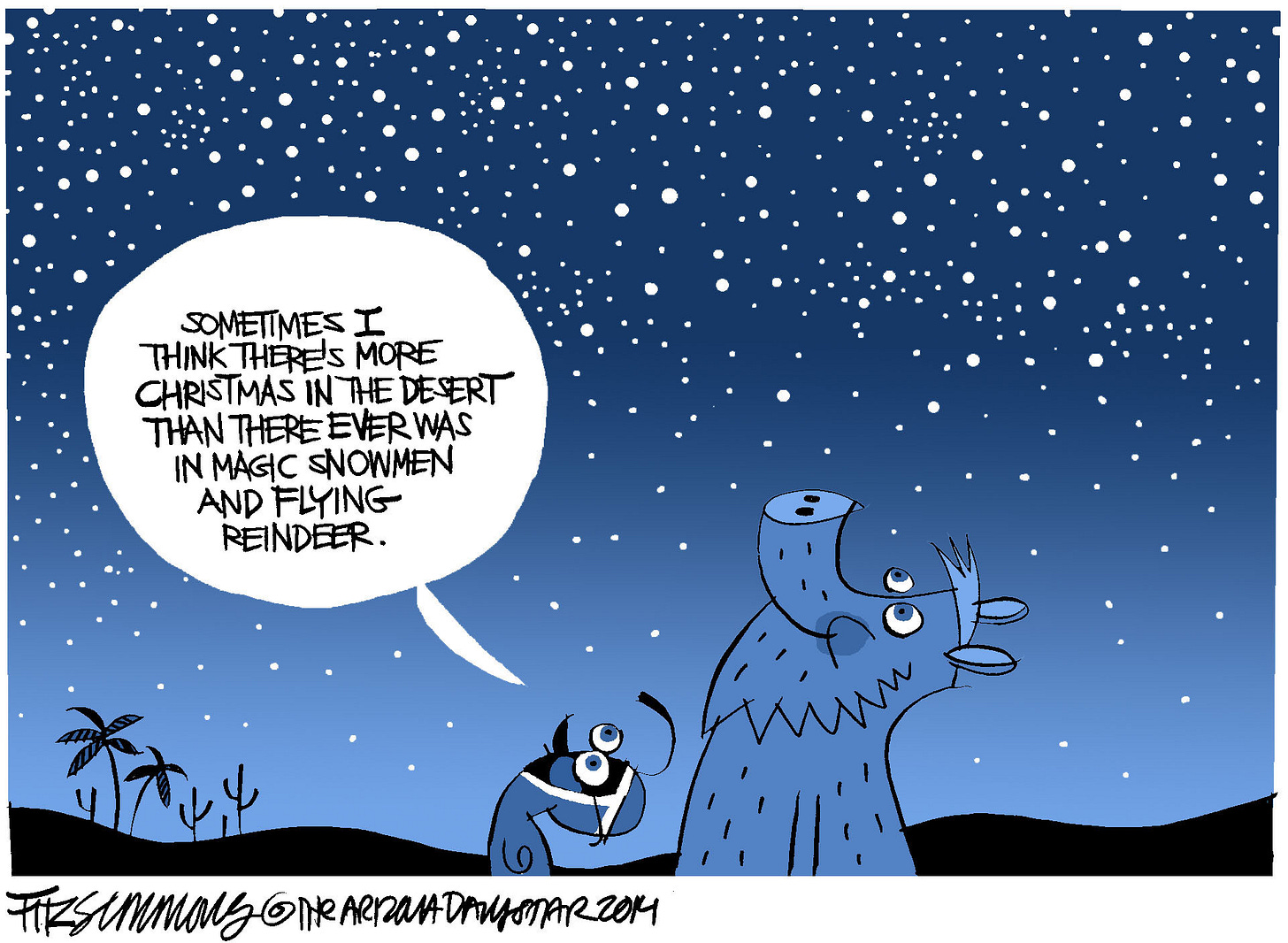As child I remember looking out at the dry desert behind our home searching among the cholla and creosote for the snow white winter wonderland I saw in every single holiday show on our Magnavox.
I saw no dancing snowmen, no elves, and no red-nosed reindeer. Only tumbleweeds, jack rabbits and the occasional cactus wren in a mesquite tree, a poor substitute for the celebrated partridge in a pear tree.
I ached to be where the “Other Christmas” was taking place, the one with the cool frozen lakes that Snoopy skated across, the one with one-horse open sleighs that jingle jangled through snowy woods and where snowballs fights were as common as the dry tumbleweeds that tumbled down our sadly sunny street.
Growing up here I had two questions for the Master Sergeant. “Was “Catalina” Santa’s last name?”
“No.”
“What do Santa Claus and sleigh bells have to do with a baby born in a desert?”
“Ask your mother.”
How did Frankincense, Gold and Myrrh give way to pine-scented pine cones and pumpkin spice? As the years have passed I have come to reject Hollywood’s polar-centric propaganda and I have come to believe with all my heart that Christmas is here, here in our beautiful, wondrous, magical desert, not in the holly-soaked script peddled by Frosty, Rudy and Bing.
Yes, mis niños, Christmas is here in our desert, where, at dusk, the palms silhouetted against the sky slowly filling with a billion stars call to mind ancient evenings in Antioch and Jerusalem.
Let us pray for the misguided newcomer who pines for snow-covered woods because they have obviously never examined a globe and are woefully unaware of the location and topography of Bethlehem.
It is in the deserts of the world where healers, sages, revolutionaries and saviors are born, martyred and celebrated.
Behold San Xavier del Bac, where the nativity displayed inside the candlelit mission reminds us that the celebrated infant was the brown child of a desert people.
Behold our desert town, where every varmint worth his weight in Christmas Tamales can find Winterhaven blindfolded, and can name all eight of the javelina pulling Santa’s sleigh and can set you straight on the real Rudolph. Every Tucsonan knows Gene Autry should have been singing about Rudolph “The Red-beaked Roadrunner” not some ridiculous made up nonsense about a reindeer.
When Christmas Eve comes to the desert the homeless will be given warm beds, the cactus wrens will hush, the office lights in our valley will go dark, one by one and we’ll scurry home like quail to las familias. I’ll feed Mesquite into our chiminea and watch the smoke drift up to the stars, a sure sign to Santa that we are here and waiting, in the desert.
And on Christmas Day many of us will go to grandmother’s hacienda, over the arroyo and through no woods, while others will wander into the desert to find God in a canyon trail. Here, in the desert, you can seek the mystical beneath countless stars, while our woodland friends can only wonder stare up at the grey shroud of merciless winter.
We know little lasts out in this desert unless it’s made of stone, or a more enduring material, such as love. On Christmas morning, the Christians in my desert town will be mindful of the truths we all hold dear. The greatest treasure we’ll ever possess in this fleeting, fragile existence is the love of our friends and family, with whom we’ll rise to greet the promise of another blessed day.
In our desert pueblo we all practice the lessons of the peasant child whose birth many in my village celebrate. We welcome the stranger. We visit the prisoner. We serve the poor. We feed the hungry. We are a voice for the least among us. We forgive. We judge not. We volunteer. We give, joyfully. We struggle to love our enemies as we would love ourselves. Day in and day out. In our desert town we fold the spirit of Christmas into our daily lives. We harken to the ancient admonitions to clothe the naked, to forgive the trespasser, to feed the hungry, and to love our enemies, because centuries later we are still moved by sacred wisdom that sprang from the desert of palms, olives and figs, not the pagan woodlands of poinsettias, fruitcakes and holly, and most assuredly, not the cartoon world of dancing snowmen and flying reindeer.
Tell your children there is more of Christmas in our desert sand and stars than there ever was in television’s ridiculous sleigh bells and snowmen. Look to the stars above and on Christmas let us remember it is in the desert where mystics rise. And where miracles have come to pass.







Fitz
Your Christmas message captured what we loved about the desert snd Tucson.
Thanks for sharing and have a wonderful time with your family.
Dean and Karen Umemoto
Thanks for a lovely essay and your work throughout the year--the years, I should say! Merry Christmas!